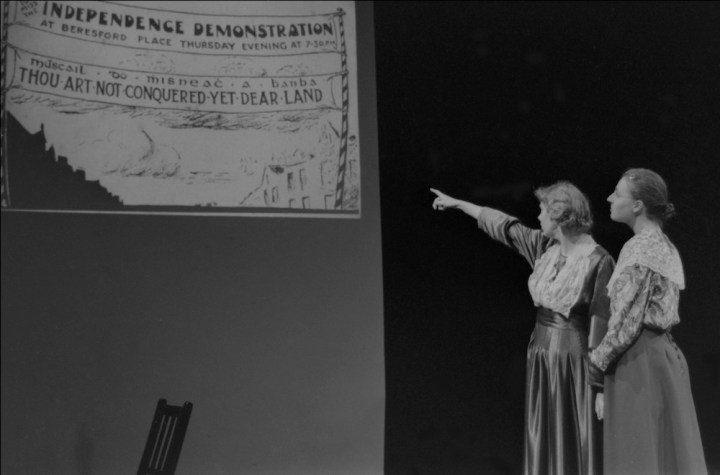Guest post by Jacqueline Mulhallen
Rebels and Friends – a play about Constance Markievicz and Eva Gore-Booth, written by Jacqueline Mulhallen, directed by William Alderson, and produced by Lynx Theatre and Poetry

In 1918 Constance Markievicz was the first woman elected to the British Parliament. Because she was a a member of Sinn Fein, she did not take her seat, and there is some doubt whether she would have been eligible, though that question was not raised at the time! Instead, she became Ireland’s first minister of Labour under the illegal Sinn Fein Parliament in Ireland and the only female Cabinet Minister at the time apart from Alexandra Kollontai in the Soviet Union. Later, she became a founding member of Fianna Fail.
Constance had been an active campaigner for the independence of Ireland, and she was one of the leaders of the 1916 Easter Rising in Dublin. Although all the other leaders were shot, she was reprieved because a woman. It is said that if she had been shot, ‘half Debrett’s would have had to go into mourning’ (Debrett’s was the list of British Peers), because she was a member of the wealthy Gore-Booth family of Sligo. When she was released under a general amnesty in 1917, the streets of Dublin were packed for her triumphant return.

Constance’s sister, Eva Gore-Booth, was just as much a rebel in her way as Constance. Despite being suspected to have tuberculosis, Eva spent much of her life in Manchester with her close friend, Esther Roper, working among the mill girls as a trade union representative and getting them to fight for better working conditions and for votes for women. Christabel Pankhurst was inspired by Eva and Esther, to found the Women’s Social and Political Union (WSPU).
Both sisters were artistic. Eva was a noted poet, friend of W.B. Yeats and AE (George Russell), and a pacifist and member of the No Conscription Fellowship during WW1. She worked for peace alongside such women as Emmeline Pethick-Lawrence, Sarah Reddish, Helena Swanwick and Isabella Ford. Constance was a painter, and met her husband, Casimir Markievicz, while studying art in Paris. She continued to paint while in prison – and she was often imprisoned during the struggle for Irish independence.

The fact that Con and Eva spent most of their adult lives separated by distance and prison walls created a problem for a playwright, and Lynx Theatre and Poetry solved this in a unique way when they launched their play about the sisters at the East End Festival in 1989. Picking up on Con and Eva’s belief that they had a telepathic rapport with each other, Rebels and Friends, was performed by just two women, who hold a continuous conversation whilst almost never being actually face to face. One reviewer referred to this as ‘an absorbingly conversational form’, and performers found that they too developed a high level of rapport with each other.
With a huge cast of recorded voices (in probably the first use of digital audio in touring theatre), and over 600 images projected behind the performers, the audience saw this turbulent period of history through the eyes and ears of the two sisters. The slides included archive images of the Easter Rising, the War of Independence, the Civil War in Ireland, the struggle for women’s rights and peace in England and more. These were intermingled with Con’s paintings and specially commissioned photographs of County Sligo, England and Italy. The National Library of Ireland, the Sligo Museum, the Imperial War Museum, and others were overwhelmingly supportive, and we were given permission to use traditional Irish music played on the harp by Grainne Yeats and on the fiddle by Michael Coleman and rebel songs recorded by Dominic Behan. The performance also used specially choreographed dance.

Rebels and Friends made two tours of Ireland, in 1989 and 1990, and ran at Dublin’s Andrews Lane Theatre in 1992. Not only that, it toured England three times, from Berwick on Tweed to Lewes in Sussex and Honiton in Devon, receiving praise from audiences and reviewers in both countries. The Cork Examiner commented that “There is a documentary sweep which lifts it above mere theatre and unfolds history in quite the most absorbing fashion.”
2018 is the centenary of Con’s election to Parliament and of the end of the WW1, which Eva campaigned to end. Already, there has been an exhibition about Con and Eva at the Irish World Heritage Centre, Manchester, so it seems a perfect time to relaunch the play and bring the achievements of these two remarkable women to a wider public. The Liverpool Irish Festival is interested, as is the Irish World Heritage Centre, and we are looking for more venues and funding bodies to support the project.
Look out for Rebels and Friends and Lynx Theatre and Poetry!
Jacqueline Mulhallen
Interested in suffrage and the theatre? Read our other blogposts:
- Suffrage in the Spotlight by Naomi Paxton
- ‘What makes a little girl of principle become a lurking shadow in the night?’ by Claire Moore
- Sylvia Pankhurst, Artist and Suffragette by Jacqueline Mulhallen

One thought on “Rebels and Friends, Constance Markievicz and Eva Gore-Booth”
Comments are closed.